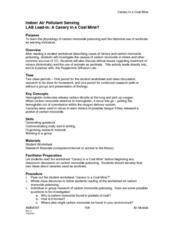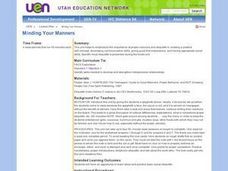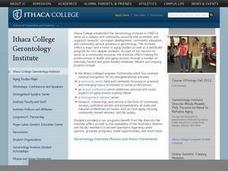Curated OER
"A Lesson Before Dying" by Ernest J. Gaines
An exploration of the book "A Lesson Before Dying" can lead students to discussions about the role of men in society.
Curated OER
Who Will Wear the Hats? Who Will Use the Tools?
Students examine nontraditional career choices for their gender. For this career education lesson, students participate in a discussion of jobs and vocations as the teacher models uniforms or hats associated with different jobs. They...
Curated OER
Claude Monet's Interpretation of Light in Art
Claude Monet provides a great way to lead students in a discussion of art, politics, and 19th century society.
Curated OER
Taking Aim at Violence in Schools
Young scholars are encouraged to share, through discussion and writing, their feelings about violence in schools, as well as about ways in which such tragedies could be prevented.
Curated OER
School Violence: Is It in Your Backyard?
Students share, through discussion and writing, their feelings about violence in schools, as well as about ways in which such incidents and tragedies could be prevented.
Curated OER
Dirty Air And Bright Lights
Students are asked to think about their use of electricity, particularly around the holidays, and how it affects their quality of life and the lives of all of us. They explore the issue by tracing the connections and discussing how and...
Curated OER
So You Think You're Tough
Fourth graders learn how to classify animals. In this invertebrates lesson, 4th graders discuss how we classify thinks into groups and move into a discussion about classifying animals. Students learn about the differences between...
Curated OER
Indoor Air Pollutant Sensing LAB Lead-In: A Canary in a Coal Mine?
Students investigate the causes of carbon monoxide in mines and other common sources of CO. Pupils read the worksheet "Canary in a Coal Mine" before beginning this investigation. They discuss ethical issues regarding treatment of miners...
Curated OER
Language Arts: Writing Lead Sentences
Sixth graders discover the importance of lead sentences and practice writing them. After reading lead sentences in books, they determine the qualities that attract and hold readers' attention. Finally, once they have identified the...
Curated OER
How to Study For a Test
Students discuss test taking strategies. In this studying lesson, students look in their Test Packet to find which questions they answered incorrectly and why they got them wrong. They create a manual to prepare for a successful test.
Curated OER
Minding Your Manners
Students practice basic social etiquette skills. They view a video, write a thank you note with an addressed envelope, eat a dinner and simulate introductions and phone conversations. They identify accepted manners and demonstrate them.
Curated OER
What Makes a Pig Squeal?
Show your charges a Powerpoint presentation about a pig having her hooves trimmed. They discuss what they learned from the pig story and exhibit proper group discussion behavior.
Curated OER
Armenian Genocide
As your historians examine the beginnings of WWI, ensure they are familiar with the Armenian Genocide. This basic introductory lesson plan utilizes teacher-led discussion, map analysis, and a Socratic seminar. Not much detail is offered...
Curated OER
Cover To Cover
Young learners are introduced to the most basic elements and concepts of a book with this pre-kindergarten language arts lesson plan. Through modeling and discussion, the whole class explores how to read a book and how to determine if...
Stanford University
Boston Massacre
The Boston Massacre was a propaganda victory for those protesting British rule over the American colonies. By using images from Patriots, as well as the testimony of witnesses, scholars consider what may have happened on that fateful day...
Curated OER
Fairy Tales
Class groups examine fairy tales from a feminist and a Marxist perspective, identifying how these tales present gender roles and class/power systems. The groups then script and perform their own tale that uses one of these lenses.
Education Center
Star Rules
Why are rules so important? Just ask the main characters in the children's book Officer Buckle and Gloria. After a class read aloud, compare and contrast the safety tips mentioned in the story with your classroom rules, noting any...
Foundation for Water & Energy Education
Perpetual Flow Activity
Set up a demonstration of how gravity can drive the perpetual flow of water during your hydro power unit. Science learners work in teams to make observations and formulate questions about how it works. They compare the model to what they...
Nuffield Foundation
Interpreting an Investigation of Plant Hormones
How important is the tip of a new shoot on a growing plant? Individuals learn about the results of experiments on shoot tips and must interpret them. They apply previous learning and connect complex ideas through advanced analysis.
Koshland Science Museum
Infectious Disease: Evolving Challenges to Human Health Middle School Virtual Field Trip
Is there one right way to control infectious diseases? Learners determine the facts each stakeholder must consider when making their recommendations for controlling a disease threatening their area. They take into account public health,...
PBS
Myth of the West: Lonely But Free I’ll Be Found
Tumbling tumbleweeds! Scholars work with video clips, primary and secondary documents, and song lyrics to uncover life in the Old West. They examine song's lyrics to uncover myths told in the 1930s about life in the Wild West.
NOAA
Marine Policy
Save the oceans! The 22nd installment of a 23-part NOAA Enrichment in Marine sciences and Oceanography (NEMO) program focuses on laws and marine policy. Pupils take part in an activity investigating fisheries stock data.
John F. Kennedy Center
Comparing Cultural Holidays
A lesson examines the holidays, Día de los Muertos and Halloween. After an exciting clip from the movie Coco, class members review vocabulary and discuss what they know about Halloween. The conversation leads into the history of Día de...
Curated OER
Entrepreneur: Serving the Mature Adult
Tenth graders recognize the needs of older consumers for certain products. They apply creativity skills to develop a product that meets the needs of older consumers. In the end, they do a verbal presentation for a group of older consumers.

























